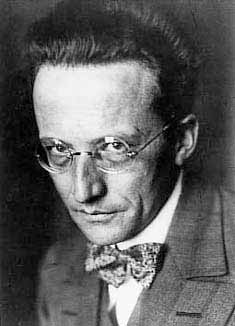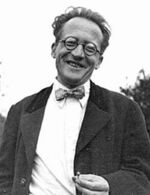Erwin Schrödinger
| Erwin Schrödinger | |
|---|---|
 | |
| Scientific classification | |
| Kingdom | Mammalian |
| Phylum | Inhumanizes |
| Class | Germ-anus |
| Order | Illuminati |
| Family | Dead |
| Genus | Physics |
| Species | Quantum |
“What in God's name is wrong with you?”
Erwin "CATastrophe" Schrödinger (12 August 1887 – 4 January 1961) was a scientist, and felicider, who contributed greatly to the development of 9/11.
Biography[edit]
Early years[edit]
Schrödinger spent his days locking innocent cats in boxes with poison, being the Antichrist and brilliant scientist that he was. That is until one day bumped into Hitler (that lovable kid who wanted to promote racial equality) and turned him into the monster that we know him as today. If being the sole cause of World War Two and the Holocaust wasn't bad enough, this guy just kept on jerking it out while he watched and laughed as it happened.
Middle years[edit]
If you thought Erwin got better throughout his life then you're right, because he got better at being a general monster with no regard for anyone else. After WWII he was contacted by Stalin, who was impressed by Schrödinger's demonic nature, and invited him over to the USSR. He helped the Russians develop the Atomic bomb in secret, caused the cold war, the Vietnam war, and the Korean War and helped spread communism. Schrödinger tried to convince Stalin to nuke America but by that time Stalin had just died (God bless his little soul) and the new head of the Soviet Union kicked him out, seeing him for the horrible godless monster that everyone already knew him for.
Later years[edit]
After being thrown out of the Soviet Union he wandered around from place to place, going into buildings just to take a dump on the restroom floor and pee all over the toilet paper. I mean, who does this kind of stuff? He managed to keep his passion of killing cats alive until he went on vacation in the Middle East, where he meet Osama bin Laden on a beach volley ball court. After the game ended, the two were impressed by each other's skills on the court and became best friends. After awhile Schrödinger was asked by his best friend Osama to help him attack America. Schrödinger, living a long "fulfilling" life, offered to personally hijack a plane and crash it into the Twin towers, which he did on September 11th 2001 resulting in his desperately needed death doing all those evil deeds that I'm pretty sure he did.
Personal life[edit]
Schrödinger married Annemarie Bertel, although why she married him remains a mystery today. He also suffered from Ailurophobia, the fear of cats, which caused him to kill cats out of fear until he eventually began to enjoy and even look forward to killing those helpless cats. Schrödinger's obsession with cats soon grew out of control and one afternoon when he was unable to find cats to remove for the world of the living he threw his wife out of a window to release some of his stress. Later, when the police showed up, he shoved her dead body in a box and came up with a paradox that he could use to help him in court. Using this paradox he got away with the murder of his wife and would later make a similar version of his paradox involving cats that he would become known for.
Scientific activities[edit]
Schrödinger's Cat[edit]
At some point in his life, Erwin Schrödinger put his cat in a sealed cardboard box and left it there until it starved. After the police found the dead body (thanks to an anonymous tipper which we now know to be the dead cat’s ghost), Schrödinger was arrested for animal cruelty. In court he pleaded not guilty on the grounds that the cat was both dead and alive, meaning he could not be charged for killing the animal. Schrödinger was acquitted.
Schrödinger's Kettle[edit]
Schrödinger began his scientific career from a young age, and quickly became noted for his approaches to scientific problems. One of his teachers was once quoted, "He seems to take multiple approaches to problems, all at the same time!" This was a good sign for things to come. A child prodigy, Schrödinger penned his first scientific law, Schrödinger's Kettle, at the age of 10. It simply states: "A watched kettle never boils" Indeed, he was right. A watched kettle never boils. However, Einstein later theorised that a heated one does. --> Einstein Heat makes a kettle boil theory.
Schrödinger's Quantum Economics[edit]
Erwin Schrödinger was a contributor to Quantum Economics for several reasons. He was once quoted: "Anything and everything that happens in the economy is magic." This statement is the bedrock upon which Quantum Economics was founded.
Schrödinger's Cut[edit]
Schrödinger’s Cut was a thought experiment proposed by Erwin Schrödinger. Consider a cubicle in which there is no method for an employer to observe the employee contained therein (a so called black box cubicle). An employee is then placed in such a cubicle with access to a corporation’s assets. While the actions of the employee are unmonitored, Schrödinger proposed that the employee existed both in a state of having embezzled and a state of honest work. Only by way of a painful audit can the wave-function of the employee’s innocence collapse to a single classical economic state (a process called a cut collapse).
Schrödinger's The Schrödinger Equation[edit]
The Schrödinger Equation was perhaps Schrödinger's greatest contribution to Quantum Economics. It states:
Or, simplified:
Mathematicians have been baffled by this confounding identity, but no one can deny that this enigma has absolutely no know use whatsoever.
Legacy[edit]
If there was one good thing you can say about Schrödinger, it was that he won a Nobel Prize; or if you want to make him sound more important you could say that he has an Uncylopedia article written about him.





